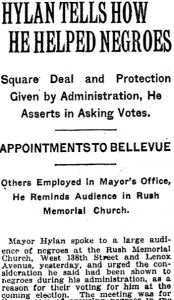We’ve now moved into specializations for our Burleigh projects, which means as peers slave over normalizing and checking over data, organize extensive bibliographies, and design maps, I am doing the same thing I have been all month: researching!
As a certified researcher, my main goal is to limit the amount of new information that goes into the spreadsheets (which is so hard to do!) and solidify the information we already have, filling in blanks and scouring the internet and libraries of the world for stray addresses and dates. That leaves me, Izzy, and Miles to work intensely and at a pretty fast pace to get everything that is research-based finalized and prepared for our classmates to use. Unfortunately, that means the job is pretty front-loaded.
Not only is it front-loaded, but it’s also significantly harder. There is a reason the spots were left blank to begin with: our peers couldn’t find the information easily. This becomes especially true for locations of places that no longer exist. If there is one thing I have learned through this whole endeavor, it is that the information is rarely sitting in front of you in one, nice long newspaper article.
For example, Izzy and I spent hours of research time over the past few days trying to find the location of a Rush Memorial Church located somewhere in New York City. After some simple searching, it became quickly obvious that the place no longer exists. The lead came from The Crisis, which didn’t give us much to go on to begin with, but that never stopped us.
Eventually, I found its location, but in the context of something completely different—instead of a performance, it was a mayor giving a speech. But the context in which the church was mentioned didn’t matter: the location did.
All of this, of course, is proof that you shouldn’t ever be discouraged. You’ll find the information eventually. Patience is key. Don’t get frustrated, and make sure you take breaks! I can’t tell you the amount of times that I have found one bit of information while looking for or doing something entirely different. Taking breaks every hour or so is one of the most important things you can do to regain focus. Everyone’s way to focus is different (for me, that means sitting at a desk alone, listening to jazz, preferably with a pot of coffee nearby), but once you try a few different things, you’ll figure out what suits you best. Once you get into the flow of researching, those blanks will seemingly fill themselves.

You must be logged in to post a comment.